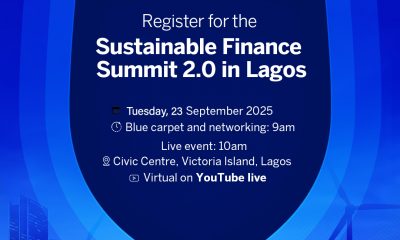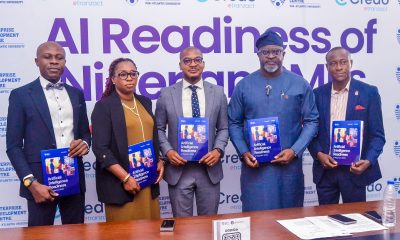Technology
Amazing ChatGPT Prompt To Help You Improve Your Content Creation

By Kenneth Horsfall
In today’s digital age, content creation has become a vital skill for businesses and individuals alike. Whether you’re a marketer, a blogger, or a student working on assignments, generating high-quality and engaging content is essential.
However, sometimes, we all hit a creative block or struggle to find the right words. This is where ChatGPT, an advanced language model, comes to the rescue. In this article, we will explore some amazing ChatGPT prompts that can help you elevate your content creation to new heights.
ChatGPT Prompt To Help You Improve Your Content Creation
Brainstorming Ideas
ChatGPT is an excellent tool for generating ideas. You can simply input a topic or a general idea, and the AI can provide you with a list of potential content ideas. For instance, if you’re a food blogger looking for fresh recipe ideas, you could ask ChatGPT, “Can you suggest unique dessert recipes with a tropical twist?” In seconds, you’ll have a variety of creative ideas to explore.
Content Outlining
Once you have an idea, the next step is to create a well-structured outline for your content. ChatGPT can help you by summarizing key points, providing a structure for your article or video, and suggesting subtopics or sections. This makes the process of organizing your content much more efficient and ensures your message flows logically.
SEO Optimization
Search engine optimization (SEO) is crucial for getting your content noticed online. ChatGPT can assist by suggesting relevant keywords, and meta descriptions, and even crafting compelling titles that are more likely to rank well in search engines. By asking for SEO tips, you can improve your content’s visibility and reach a wider audience.
Proofreading and Editing
A polished piece of content is essential for maintaining professionalism and credibility. ChatGPT can help with proofreading and editing suggestions. Simply paste your content, and request, “Please edit and proofread this text.” ChatGPT will highlight errors, suggest improvements, and offer alternatives to enhance the quality of your content.
Writing Assistance
If you’re stuck in writer’s block or need help improving your writing, ChatGPT can be your go-to companion. You can provide a partial sentence or paragraph, and the AI can complete it in a cohesive and engaging manner. It’s like having a writing assistant available 24/7 to help you draft compelling content.
Generating Conversational Content
Conversational content is engaging and relatable. You can use ChatGPT to generate dialogues or conversations between characters for your content, making it more dynamic. Whether you’re working on a script, a role-play scenario, or a storytelling piece, the model can help you create realistic dialogues.
Localizing Content
If your content is intended for a global audience, you might want to localize it for different regions or languages. ChatGPT can help with this by providing translations and culturally relevant adaptations. It can also assist in maintaining the tone and style of your content while making it suitable for diverse audiences.
Social Media Content
Creating engaging social media content that captures your audience’s attention is an art. ChatGPT can help you generate captivating captions, tweets, or Facebook posts. You can input a photo or describe the context, and the AI will suggest suitable and attention-grabbing text to accompany it.
Simplifying Complex Concepts
In many fields, content creators often deal with complex ideas or jargon that might be challenging for the average reader to understand. ChatGPT can simplify these concepts. For example, if you’re working on a tech-related article, you can ask the model to explain a complex algorithm or a new technology in simpler terms.
Trend Analysis
Staying up-to-date with the latest trends in your industry is vital for producing relevant content. ChatGPT can assist in researching and summarizing current trends, emerging topics, or industry news. By tapping into the power of real-time information, your content can remain fresh and engaging.
Conclusion
The amazing ChatGPT prompts mentioned above are powerful tools for content creators looking to streamline their process, enhance the quality of their work, and engage their audience effectively. By integrating AI-powered assistance into your content creation workflow, you can save time, improve your content’s quality, and ultimately achieve your goals more efficiently. As technology continues to evolve, leveraging tools like ChatGPT is an investment in the future of content creation, and it’s something every content creator should consider.
Kenneth Horsfall is the creative director and founder of K.S. Kennysoft Studios Production Ltd fondly called Kennysoft STUDIOs. Kennysoft STUDIOs is a Nigerian Video and Animation Production Studio. And also, the founder and lead instructor at Kennysoft Film Academy. I can be reached via di******@*************io.com
Technology
Telecom Operators to Issue 14-Day Notice Before SIM Disconnection

By Adedapo Adesanya
Telecommunications operators in Nigeria will now be required to give subscribers a minimum of 14 days’ notice before deactivating their SIM cards over inactivity or post-paid churn, following a fresh proposal by the Nigerian Communications Commission (NCC).
The proposal is contained in a consultation paper, signed by the Executive Vice Chairman and Chief Executive Officer of the NCC, Mr Aminu Maida, and titled Stakeholders Consultation Process for the Telecoms Identity Risks Management Platform, dated February 26, 2026, and published on the Commission’s website.
Under the proposed amendments to the Quality-of-Service (QoS) Business Rules, the Commission said operators must notify affected subscribers ahead of any planned churn.
“Prior to churning of a post-paid line, the Operator shall send a notification to the affected subscriber through an alternative line or an email on the pending churning of his line,” the document stated.
It added that “this notification shall be sent at least 14 days before the final date for the churn of the number.”
A similar provision was proposed for prepaid subscribers. According to the Commission, operators must equally notify prepaid customers via an alternative line or email at least 14 days before the final churn date.
Currently, under Section 2.3.1 of the QoS Business Rules, a subscriber’s line may be deactivated if it has not been used for six months for a revenue-generating event. If the inactivity persists for another six months, the subscriber risks losing the number entirely, except in cases of proven network-related faults.
The new proposal is part of a broader regulatory review tied to the rollout of the Telecoms Identity Risk Management System (TIRMS), a cross-sector platform designed to curb fraud linked to recycled, swapped and barred mobile numbers.
The NCC explained in the background section of the paper that TIRMS is a secure, regulatory-backed platform that helps prevent fraud stemming from churned, swapped, barred Mobile Station International Subscriber Directory Numbers in Nigeria.
It said this platform will provide a uniform approach for all sectors in relation to the integrity and utilisation of registered MSISDNs on the Nigerian Communications network.
In addition to the 14-day notice requirement, the Commission also proposed that operators must submit details of all churned numbers to TIRMS within seven days of completing the churn process, strengthening oversight and accountability in the system.
The consultation process, which the Commission said is in line with Section 58 of the Nigerian Communications Act 2003, will remain open for 21 days from the date of publication. Stakeholders are expected to submit their comments on or before March 20, 2026.
Technology
Silverbird Honours Interswitch’s Elegbe for Nigeria’s Digital Payments Revolution

By Modupe Gbadeyanka
The founder of Interswitch, Mr Mitchell Elegbe, has been honoured for pioneering Nigeria’s digital payments revolution.
At a ceremony in Lagos on Sunday, March 1, 2026, he was bestowed with the 2025 Silverbird Special Achievement Award for shaping Africa’s financial ecosystem.
The Silverbird Special Achievement Award recognises individuals whose innovation, vision, and sustained impact have left an indelible mark on society.
Mr Elegbe described the award as both humbling and symbolic of a broader journey, saying, “This honour represents far more than a personal milestone. It reflects the courage of a team that believed, long before it was fashionable, that Nigeria and Africa could build world-class financial infrastructure.”
“When we started Interswitch, we were driven by a simple but powerful idea that technology could democratise access, unlock opportunity, and enable commerce at scale.
“This recognition by Silverbird strengthens our resolve to continue building systems that empower businesses, support governments, and expand inclusion across the continent,” he said when he received the accolade at the Silverbird Man of the Year Awards ceremony attended by several other dignitaries, whose leadership and contributions continue to shape national development and industry transformation.
In 2002, Mr Elegbe established Interswitch after he was inspired by a bold conviction that technology could fundamentally redefine how value moves within and across economies.
Under his leadership, the company has evolved into one of Africa’s foremost integrated payments and digital commerce companies, powering financial transactions for governments, banks, businesses, and millions of consumers.
Today, much of Nigeria’s electronic payments ecosystem traces its foundational architecture to the systems and rails established under his leadership.
“Mitchell’s journey is inseparable from Nigeria’s digital payments evolution. His foresight and resilience helped establish foundational infrastructure at a time when the ecosystem was still nascent.
“This recognition affirms not only his personal legacy, but the broader impact of Interswitch in enabling commerce and strengthening financial systems across Africa,” the Executive Vice President and Group Marketing and Communications for Interswitch, Ms Cherry Eromosele, commented.
Technology
SERAP Seeks FCCPC Probe into Big Tech’s Impact on Nigeria’s Digital Economy

By Adedapo Adesanya
The Socio-Economic Rights and Accountability Project (SERAP) has called on the Federal Competition and Consumer Protection Commission (FCCPC) to urgently investigate major global technology companies over alleged abuses affecting Nigeria’s digital economy, media freedom, privacy rights and democratic integrity.
In a complaint addressed to the chief executive of FCCPC, Mr Tunji Bello, the group accused Google, Meta (Facebook), Apple, Microsoft (Bing), X, TikTok, Amazon and YouTube of deploying opaque algorithms and leveraging market dominance in ways that allegedly undermine Nigerian media organisations, businesses, and citizens’ rights.
The complaint, signed by SERAP Deputy Director, Mr Kolawole Oluwadare, urged the commission to take measures necessary to urgently prevent further unfair market practices, algorithmic influence, consumer harm and abuses of media freedom, freedom of expression, privacy, and access to information.”
SERAP also asked the FCCPC to convene a public hearing to investigate allegations of algorithmic discrimination, data exploitation, revenue diversion, and anti-competitive conduct involving the tech giants.
According to the organisation, dominant digital platforms now act as private gatekeepers of Nigeria’s information and business ecosystem, wielding enormous influence over public discourse and market competition without sufficient transparency or regulatory oversight.
“Millions of Nigerians rely on these platforms for news, information and business opportunities,” SERAP stated, warning that opaque algorithms and offshore revenue extraction models pose both economic and human rights concerns.
The group argued that the alleged practices threaten media plurality, consumer protection, privacy rights, and the integrity of Nigeria’s forthcoming elections.
SERAP pointed to actions taken by the South African Competition Commission, which investigated Google over alleged bias against local media content, adding that the South African probe reportedly resulted in measures including algorithmic transparency requirements, compliance monitoring and financial remedies.
SERAP urged the FCCPC to take similar steps to safeguard Nigerian media and businesses.
The organisation maintained that if established, the allegations could amount to violations of Sections 17 and 18 of the Federal Competition and Consumer Protection Act (FCCPA), which prohibit abuse of market dominance and anti-competitive conduct.
SERAP stressed that the FCCPC has statutory authority to investigate and sanction conduct that substantially prevents, restricts or distorts competition in Nigeria.
It also warned that failure by the Commission to act promptly could prompt the organisation to pursue legal action to compel regulatory intervention.
Citing concerns reportedly raised by the Nigerian Press Organisation (NPO), SERAP said big tech companies have fundamentally altered Nigeria’s information environment, creating what it described as a structural imbalance of power that threatens the sustainability of professional journalism.
Among the allegations listed are: Algorithms controlled outside Nigeria determining content visibility, monetisation of Nigerian news content without proportionate reinvestment, offshore extraction of advertising revenues, limited discoverability of Nigerian websites and platforms, and lack of transparency in ranking and recommendation systems.
SERAP argued that declining revenues in the Nigerian media industry have led to shrinking newsrooms, closure of bureaus, and the emergence of news deserts, weakening journalism’s constitutional role in democratic accountability.
The organisation further warned that algorithmic opacity and data-driven micro-targeting could influence voter exposure to information ahead of Nigeria’s forthcoming elections, raising concerns about electoral fairness and transparency.
-

 Feature/OPED6 years ago
Feature/OPED6 years agoDavos was Different this year
-
Travel/Tourism10 years ago
Lagos Seals Western Lodge Hotel In Ikorodu
-

 Showbiz3 years ago
Showbiz3 years agoEstranged Lover Releases Videos of Empress Njamah Bathing
-

 Banking8 years ago
Banking8 years agoSort Codes of GTBank Branches in Nigeria
-

 Economy3 years ago
Economy3 years agoSubsidy Removal: CNG at N130 Per Litre Cheaper Than Petrol—IPMAN
-

 Banking3 years ago
Banking3 years agoSort Codes of UBA Branches in Nigeria
-

 Banking3 years ago
Banking3 years agoFirst Bank Announces Planned Downtime
-

 Sports3 years ago
Sports3 years agoHighest Paid Nigerian Footballer – How Much Do Nigerian Footballers Earn





















